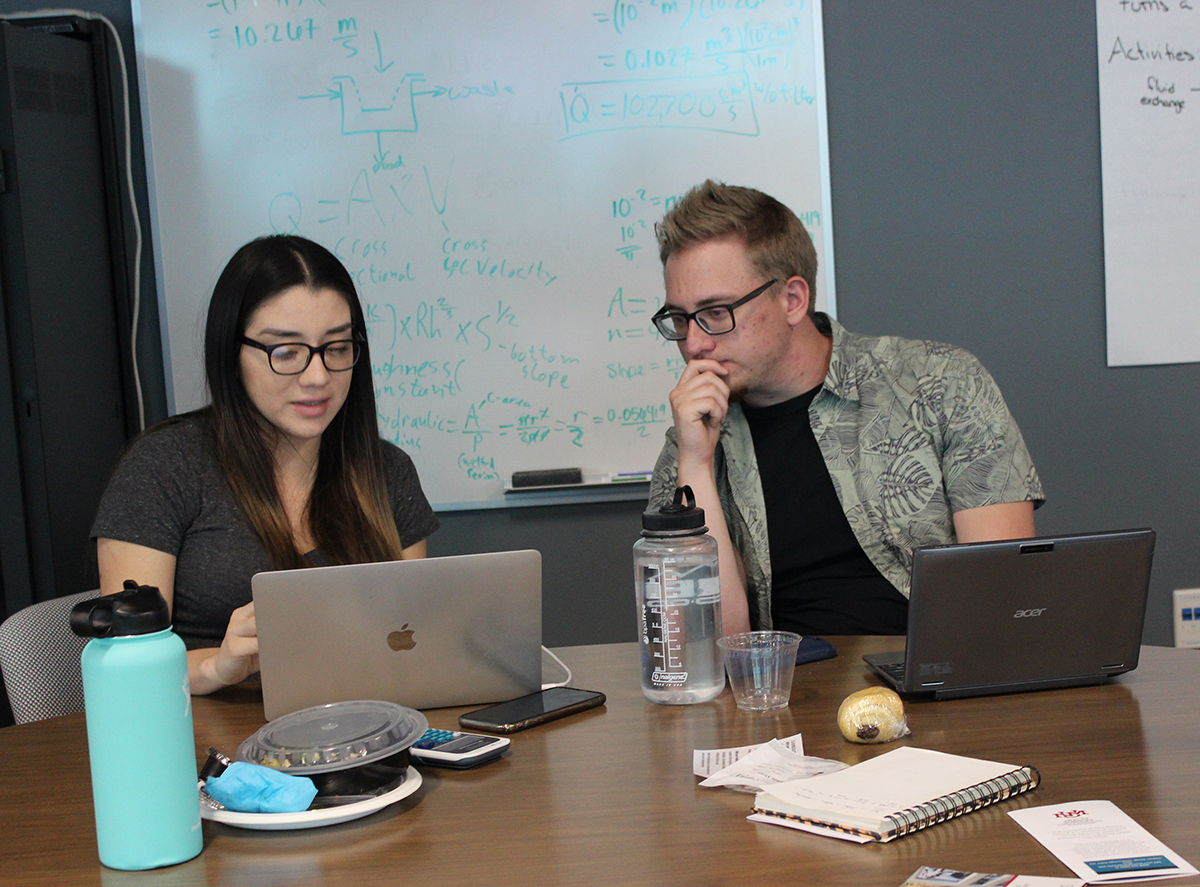Recent News
UNM Engineering team wins ASEE best paper for work on first-year engineering course
July 17, 2025
New director will enhance interdisciplinary engineering learning opportunities
July 2, 2025
Final SIRI cohort visits UNM campus
June 30, 2025
Perfetti receives ANS Landis Engineering Achievement Award
June 26, 2025
News Archives
2022 CTSC Health Hackathon planned for March 25-27
February 7, 2022 - by Kim Delker

Engineers, scientists, inventors and creators who have a passion for developing solutions in healthcare and an entrepreneurial spirit are encouraged to participate in the 2022 Clinical and Transitional Science Center (CTSC) Health Hackathon, planned at The University of New Mexico in March.
The weekend-long event, which will be held at the Domenici Center for Health Sciences Education North Wing, 1001 Stanford Drive NE, Albuquerque, will take place March 25-27. Registration is now open. Proof of vaccination will be required, and the event will follow public health orders, which currently require mask-wearing. The event is planned for in person, but organizers say the event could switch to virtual if conditions warrant.
During the three-day event, teams made up of five to eight participants will present perplexing healthcare problems, then strategize to develop novel solutions. Materials will be provided, including computers, microprocessors (Arduino and Raspberry Pi devices), 3D printers and various art supplies for modeling. Those with a variety of backgrounds, including business, the medical field, coding, engineering, entrepreneurship, programming, science and design, are encouraged to register.
The ultimate purpose of the Health Hackathon is to design and develop unique, marketable solutions that address pressing healthcare challenges, said Christina Salas, an associate professor in the Department of Orthopaedics and Rehabilitation.
“This is an intense but fun event that provides students with a great experience in the process of design thinking and working with a team to bring a marketable idea to fruition,” she said. “It is always fascinating to see all the amazing ideas that are brought to competition from so many disciplines while at the same time providing students with real-life biodesign experience.”
Participants include undergraduate and graduate students, along with faculty and community members. Participants do not need to have a team to participate. At the event, participants without a team will have the opportunity to form teams based on skillsets and interests, Salas said.
After formulating their technology, teams pitch their ideas to a panel of judges on the final day, competing for a chance to apply for National Institutes of Health pilot grants of up to $10,000 to help bring their ideas to life in the form of commercializing the technology. In order to apply for grant funding, each team must have a UNM Health Sciences Center faculty member on the proposal.
This is the third Hackathon in what is designed to be an annual event (there was no event in 2021 due to the pandemic). The last time the event was held, in 2020, there were seven teams (more than 80 participants in total) who registered. The winning ideas included an asthma smart inhaler device that attaches to a traditional spacer to provide improved medication to the patient based on the spacing between multiple puffs and a software-based system that uses QR codes to help visitors navigate their way around a hospital. Learn more about the 2020 winners here.
In addition to the CTSC, Hackathon is sponsored by ASCEND HUB, UNM Rainforest Innovations, School of Engineering, College of Pharmacy, College of Nursing and Anderson School of Management.
New this year is a Hackathon Jumpstart event, which will be held 5:30-7 p.m. Feb. 23 at UNM Rainforest Innovations. The event will provide information about the Hackathon, both for those registered for the event or who are considering registering. The workshop will provide information about the process of design thinking, presented by Nancy Lewis, director of The Canopy for Creative Collaboration at the UNM Innovation Academy, along with information on pitching business ideas. It is not required that Hackathon participants attend the Jumpstart event, but it is strongly recommended. Registration is open at this link. Refreshments will be provided, and proof of vaccination and masks will be required. As with the Hackathon, the event may move to virtual depending upon the public health orders at the time.
For more information about Hackathon or the Jumpstart events, contact Melanie Hazlett at CTSC at mhazlett@salud.unm.edu.
The Health Hackathon is one of several collaborative School of Medicine/School of Engineering initiatives. Salas, who is also a special assistant to the dean of the School of Engineering for Health Science Center relations, has since 2016 taught a graduate-level biodesign course modeled after a similar program at Stanford University. The course is jointly administered by both schools and tasks students with learning about real-life clinical challenges and developing technology to address them. Salas also directs an annual biodesign contest, jointly sponsored by the School of Engineering and CTSC, in which winning teams compete for $50,000 in funding to develop and commercialize their technology.
Another collaborative effort between the two schools is the master’s degree in nuclear engineering with a concentration in medical physics. The program is administered through the Department of Nuclear Engineering, with support provided by the Department of Radiology and the UNM Comprehensive Cancer Center.
